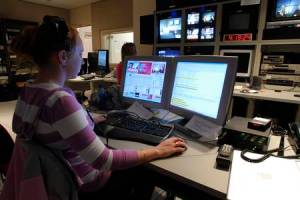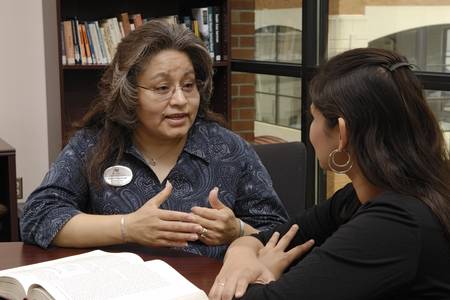The Human Side of Business
Classes
Fall 2014 Class Descriptions
Why does summer always go by so darn fast?
We don’t know, but we do know that we’re already looking forward to the start of KU’s classes on August 25th!
Are you thinking about getting back in the classroom? It’s easier than ever to take an Edwards Campus course as a non-degree-seeking graduate student. Apply now to sharpen your communication skills and deepen your organizational savvy in the fall!
- COMS 930: Applied Organizational Communication (30105)
- Thursdays 6:00-9:00 p.m., Regnier 152, Edwards Campus
- Dr. Debra Ford
- Communication is the central process in all organizational endeavors, and it profoundly influences both organizational outcomes and member satisfaction. This class considers key communication contexts and processes, including development and maintenance of relationships with peers, subordinates and supervisors, trust, feedback, persuasion and dealing with change. It also addresses team and group processes, work across cultures and generations, and effective use of communication technologies. In examining the often taken-for-granted ways in which organizations operate, organizational members can heighten their own and their organizations’ success.
- COMS 930: Stakeholders & Their Organizations (25876)
- Tuesdays 6:00-9:00 p.m., Regnier 254, Edwards Campus
- Dr. Tracy Russo
- This class examines ways that organizations interact and communicate with their array of external stakeholders: customers and clients, competitors, suppliers and distributors, regulators, the press, and their communities. We will take a broad systems approach and consider networks, inter-organizational relations, and the role of technology in connecting organizations. We will examine how organizations organize into networks, how innovations diffuse through organizations, and how organizations’ attempts to establish identities have ripple effects through groups and types of organizations. We’ll also look at how organizations are influenced by pressures for corporate social responsibility and changes in legal requirements and social ethics.
Course Profile: Organizational Assessment (Spring 2013)
Are you a current student looking for a spring semester class or a friend of the program interested in getting back in the classroom and brushing up on your organizational assessment skills? Then you should consider enrolling in COMS 930: Organizational Assessment for the Spring 2013 semester!
This class will be taught by Dr. Ann Morrill on Thursday evenings from 6:00 to 9:00 p.m. in room 151 Regnier. Here’s what Dr. Morrill has to say about the class:
With increasing emphasis on “fact-based” management and the pressure for performance in highly competitive environments, organizations increasingly turn to internal managers and external consultants to assess various aspects of their business. Those “experts” are asked to assess the status of current events and diagnose “root causes” of challenges that organizations face.
Given the central role of communication to organizational performance, the assessment of root causes often involves (and sometimes focuses on) issues of communication. For that reason, it is essential that organizational communication specialists understand and apply appropriate means of assessment.
This course is designed to explore the following questions about assessment:
- Why assessment?
- What is it? What is the difference between assessment and diagnosis?
- When do I use it?
- How do I do it?
- How do I responsibly interpret what I get? (Or, what does it mean?)
- Of what use is it?
- What are the essentials of reporting my findings?
- What ethical issues must I consider?
- On what assumptions do I operate? How do those assumptions affect my answers to any/all of these questions?
In the process of answering these questions, the course will spend a substantial amount of time studying the methodologies involved in conducting communication audits–holistic assessments of communication flow and effectiveness in organizational settings.
Alumni and friends of the program are always welcome to take single classes with the department as non-degree-seeking graduate students for professional development purposes. Please contact us at laowens [at] ku [dot] edu for more information.
COMS 930: Linking–Organizations and Their Communicative Connections
Are you a current student looking for a summer course? An alum seeking professional development? A prospective student interested in getting your feet wet in something besides a swimming pool?
You might want to consider enrolling in program director Dr. Tracy Russo’s summer class COMS 930: Linking–Organizations and Their Communicative Connections. Here is Professor Russo’s course description:

Photo by David F. McKinney, KU University Relations. Copyright 2007 The University of Kansas/Office of University Relations.
This organizational communication class focuses on organizations as the level of analysis. We’ll consider questions about the communication of organizations and how organizational interact. In particular, we will examine the role of technology in connecting (and disconnecting) organizations.
Among the topics we’ll address are how technology influences organizational form, how organizations organize into networks, how innovations diffuse through organizations, and how organizations’ attempts to establish identities have ripple effects through groups and types of organizations. We’ll also look at how organizations are influenced by and influence corporate social responsibility and organizational/social ethics.
To help frame these questions, we’ll draw particularly on ideas from systems theory, institutional theory, and organizational rhetoric.
This class will meet face-to-face once a week in the months of June and July, with some meetings scheduled for Mondays and some on Wednesdays from 6:00 to 9:00 p.m. This class will also include a substantial amount of mediated interaction equivalent to a class period. Students will write two short papers and create a final project in the form of a case study, a literature review, a research proposal, or another project.
Current students can enroll online as usual. Alumni and prospective students can contact us directly at laowens [at] ku [dot] edu for information about taking the class as a non-degree-seeking student.
We look forward to seeing you on campus this summer!
Class Profile: Communication in Conflict Resolution
Conflict resolution is one of the most valuable skills an individual can bring to her workplace, home, and community. Want to learn more about how people handle conflicts and find solutions for them? Enroll in Professor Tom Beisecker’s Communication in Conflict Resolution course at the Edwards Campus this spring!
COMS 930: Communication in Conflict Resolution
7:00 to 10:00 p.m. on Monday evenings, Jan. 23-May 11
152 Regnier Hall, Edwards Campus
Description: “This course will examine the structural characteristics of conflict situations and explore the role communication variables play in them. Students will develop an overall theory of how individuals and groups determine preferences in choice-making situations and how two or more individuals or groups interact when they hold at least partially incompatible preferences to reach a mutually acceptable solution. Students shall consider the functions conflict can serve in both interpersonal and social situations. There will be a mid-semester and a final examination, and each student will be expected to develop and present a research proposal to study some topic pertaining to conflict.”

David F. McKinney, KU University Relations. Copyright The University of Kansas/Office of University Relations.
Alumni and friends of the program are welcome to take single classes with the department as non-degree-seeking graduate students for professional development purposes. Please contact us at laowens [at] ku [dot] edu for more information.
COMS 930: Seminar in Family Communication
In Spring 2012, we welcome Professor Alesia Woszidlo to the Edwards Campus! She will be teaching COMS 930: Seminar in Family Communication from 6:00 to 9:00 p.m. on Tuesday evenings.
According to Dr. Woszidlo, this class
exposes students to research trends and theory in the scientific study of the family. Specifically, the course focuses on issues related to family interaction, functioning, and communication. Readings and discussions will include marital, parent-child, sibling, and intergenerational interactions in the family. Further, research on marital satisfaction, divorce, courtship, and the impact of the family on its children (and vice versa) will be examined. It will also focus on the nature of family interaction as it is associated with family dysfunctions such as family violence, mental health problems, and marital distress.
Current students can begin enrolling this weekend (October 21-23), and prospective students still have time to apply! Please visit our admissions page for information on how to apply before our November 15th deadline.
Fall 2011 Class Highlight: Interpersonal Communication
This fall at the Edwards Campus, Professor Natabhona Mabachi will be teaching COMS 930: Interpersonal Communication in All Domains. Each Thursday night, COMS students will investigate and critique foundational and contemporary theories and research in interpersonal communication. These theories will help them frame thinking about interpersonal relationships at work, in the family, in romance and friendship, and in contexts such as health care and education.
In the business world, we know that communication does more than just convey information: it has the power to build and define relationships, as well as motivate or hinder action.
When have your interpersonal communication skills helped you to be more successful in your workplace? When have these skills (gulp!) failed you? What aspects of interpersonal communication do you wish you–or your co-workers!–had a better grip on?
Best of luck to Professor Mabachi and her students this semester!


